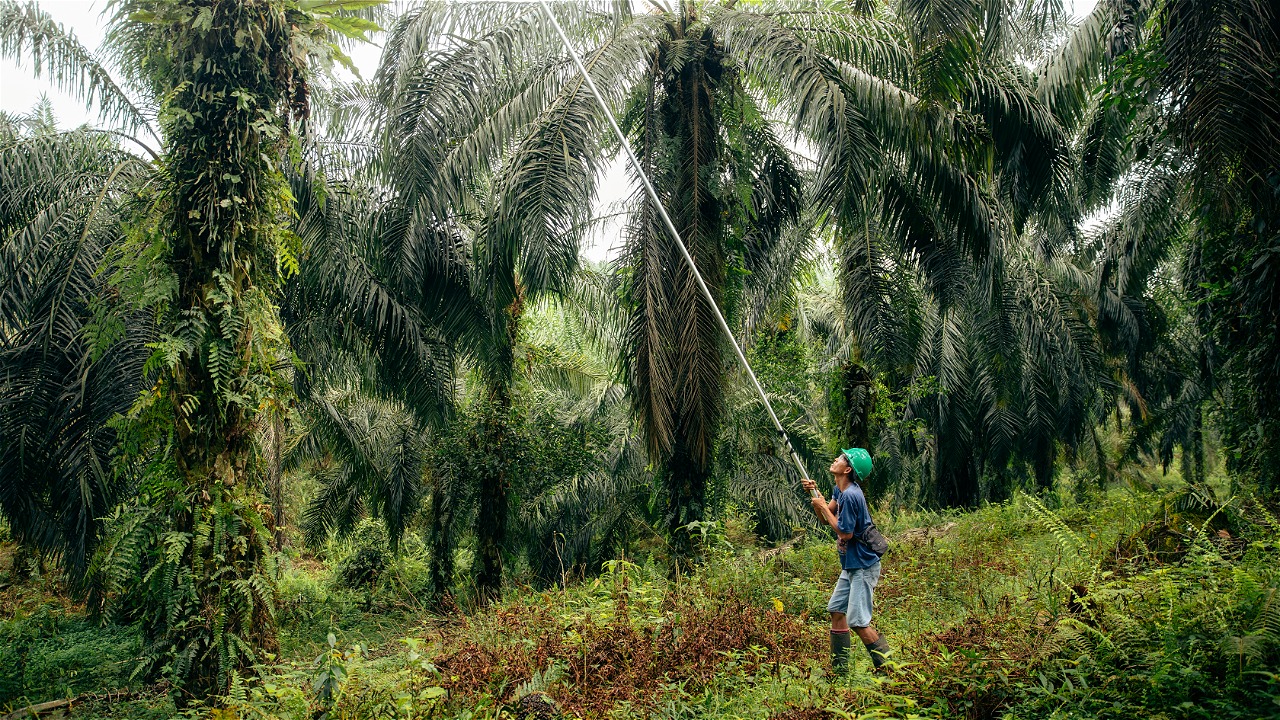TOWARDS SUSTAINABLE PRACTICE: CHALLENGES FOR INDONESIAN PALM OIL INDEPENDENT SMALLHOLDERS
By: Dani Rahadian
Indonesia’s palm oil industries started from a very humble beginning. It grows from four seeds originating from Mauritius brought for decorative function back in 1869. From its humble beginning, palm oil has bloom into Indonesia major commodities, with a contribution of about 11% from 2012 total export. Based on Ministry of Agriculture data in 2011, cultivated palm oil plantation in Indonesia covered 8 million hectares of area of which 45% is managed by independent smallholders.
Contrary to scheme smallholders who are backed by companies, in general independent smallholders cultivate oil palm without external help. They are relying to custom in managing their plantation without good agricultural practice standard. The lack of productivity resulted from this process prompt them to expand their plantation—in some cases to protected zone—to increase their production. Harrison Ford visit to Tesso Nilo National Park in Riau earlier this month open public eyes on how severe encroachment for palm oil—some are conducted by independent smallholders—posed threat to environment. This strengthens existing belief that independent smallholders are not capable of sustainable practice.
Amanah Palm Oil Independent Smallholders Association success denies that belief. The association located in Ukui sub-district, not far from Tesso Nilo boundaries managed to get their RSPO certification for sustainable palm oil plantation management, a first for Indonesian independent smallholders and a second in the world. Communal spirit and willingness to improve their practice become their foundation in implementing RSPO’s principles and criteria. Internal control mechanism and strong institution are also Amanah’s strong points. Unfortunately most of independent smallholders do not possess such things, causing their weak position vis-à-vis other players in palm oil supply chain.
Most independent smallholders work individually without any farmer organization backing them. As Individual, their market competitiveness is low. Therefore independent smallholders need to join farmer groups or economic institutions such as cooperation to create a collective force, to help them synergize and complement their strengths.
A lot of challenges await independent smallholders. Aside of financial issues as one of their biggest obstacles, a lot of independent smallholders—especially those living in remote areas—find it hard to access information and knowledge to implement good agricultural practice. Ownership of production factors, such as machinaries, pesticides, fertilizers, and certified seeds, is another challenge for them. Government and stakeholders’ role are very crucial to address these problems.
In marketing their products, both certified and uncertified fresh fruit bunches (FFB) generally stop at palm oil mills level. Mill will then process FFB into crude palm oil (CPO). As FFB must be processed within 12-24 hours, independent smallholders position have a small bargaining power in determining FFB prices. Unlike rice, FFB doesn’t have government purchase price that can provide guarantee for independent smallholders, even though palm oil has become Indonesia’s primary commodity.
Farmers Protection and Empowerment Law
National Farmers Day in 24th September shall be the momentum to address these challenges. On this day, the government enacted Basic Agrarian Law No.5/1960 securing farmers’ rights and obligations, right on land, right for agrarian sources to be managed and benefited for people welfare. This law is complemented with the newly enacted Farmers Protection and Empowerment Law (Undang-Undang Perlindungan dan Pemberdayaan Petani, abbreviated as UU P3).
In UU P3, the government stated its promise to protect and empower farmers, especially the low-scale smallholders. Specifically, Minister of Agriculture Suswono stated that this law would protect smallholders from challenges such as limited access to production factors, uncertainty of business climate and no market guarantee for smallholders’ business development. The law would also empower smallholders, developing their mindset, ability and institutional ability.
This effort made by the government need to be appreciated, because it addresses several challenges faced by palm oil smallholders, especially the independent ones. Having said so, we still need to monitor its implementation because government support is substantial in changing smallholders practice into a sustainable one.
If we take into account Amanah Association success in obtaining their RSPO certificate, we can see a robust collaboration among smallholders, the government, and other stakeholders. WWF-Indonesia as the facilitator of the certification conducted intensive consultations with Ministry of Agriculture and Plantation Agency in Provincial and District Level. During the process, corporations are actively involved in transferring technology and relevant information.
Good intention and collaboration in every level of palm oil production chain—namely corporate as the buyer, government as the policy maker and implementers of smallholders empowerment program, as well as other relevant stakeholders—are crucial in changing independent smallholders practice towards sustainability and to improve their competitiveness. KADIN Indonesia statement to fund 1 million palm oil independent smallholders through cooperative scheme is a very encouraging news. The funding scheme will help answers financial issues to implement good agricultural practice.
With help from all, Indonesia smallholders can answer doubts about their capability to implement good agricultural practice. Through responsible practice, it is hoped that smallholders production can be more productive and efficient, with an edge to penetrate global market.
The writer is WWF-Indonesia’s palm oil senior officer for smallholders engagement. He has been working for more than 11 years for palm oil in WWF-Indonesia and currently in charge for independent smallholders certification in Sumatra and Kalimantan.





